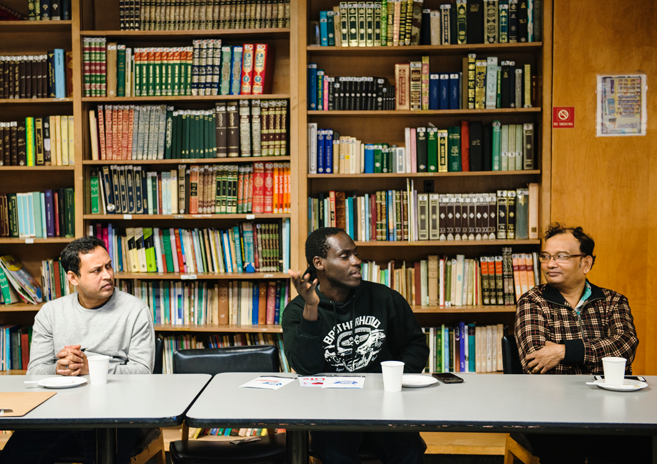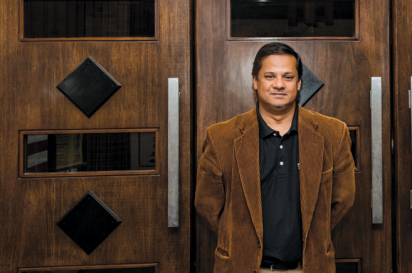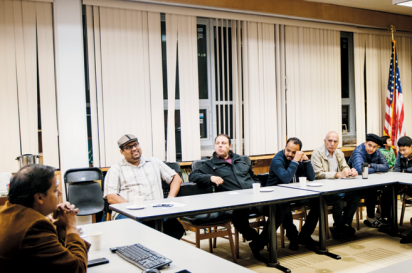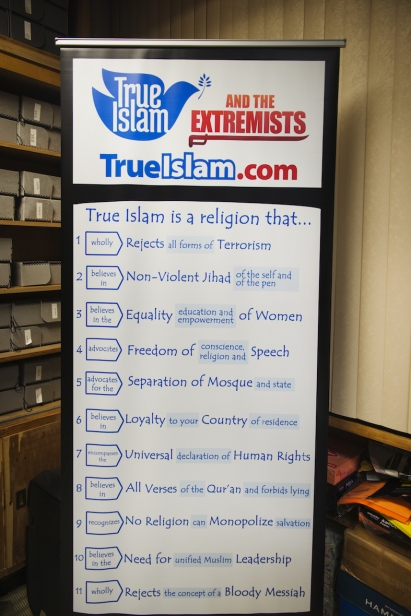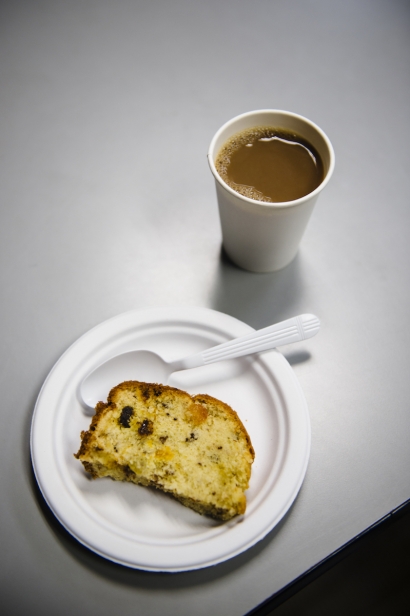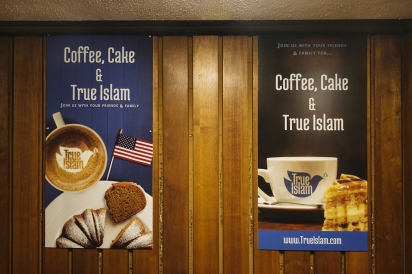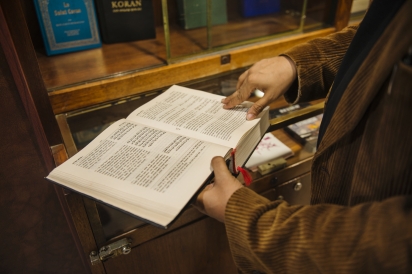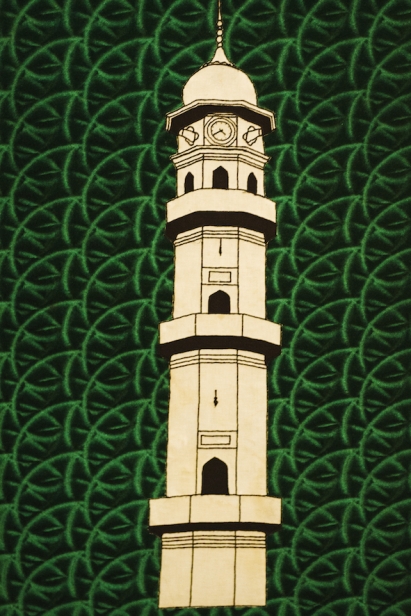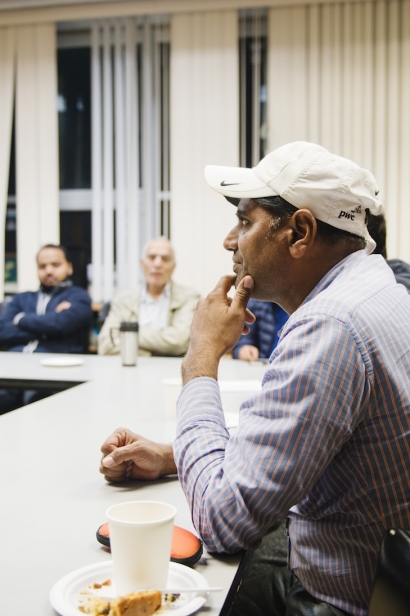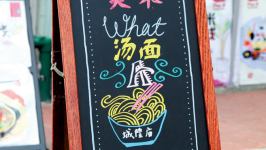Coffee, Cake and Islam: Promoting Peace and Dialogue in Queens
When my Texan, wife-of-a-Southern-Baptist-minister mother was in town recently, I brought her to the Ahmadiyya Muslim Community Center in Hollis on a Thursday evening. It was dark and quiet inside the sprawling mosque and school, except for the sound of chanted prayers coming from the heart of the men’s prayer hall.
We were ushered into a room and instructed to wait—the evening prayer service was almost over, and we would soon be joined by several members of the congregation. After helping ourselves to Dunkin’ Donuts coffee and fresh-baked cake slices, we settled into our seats at a U-shaped table abutting a yank-down projector screen.
Similar to my father’s study full of Hebrew and Greek dictionaries and the Bible in King James, New International and English Standard versions, the Ahmadiyya Center’s inner room felt like a scholar’s den. Instead of Christian iconography though, its wraparound bookcases were full of Islamic holy books: the Quran, the Scrolls of Abraham and Scrolls of Moses. As we waited, we introduced ourselves to a retired doctor and his wife who have lived in the neighborhood for several years.
Mirza Ghulam Rabbi strode into the conference room in a blazer, pert and professorial. The assistant national director of outreach for the Ahmadiyya Muslim Community, he has been the leader of the Queens chapter of Coffee, Cake & True Islam since it began two years ago. True Islam is a national campaign that started in 2015 to help dispel myths about Islam. One of the campaign’s several outreach arms is Coffee, Cake & True Islam, an informal, open-house-style gathering that takes place at mosques and community centers around the U.S. every week.
The premise is simple: Anyone, Muslim or not, is welcome to join Rabbi and other worshippers from the Ahmadiyya community to share coffee and cake, and ask any questions they have about the Muslim faith. The group’s Facebook page details their mission: “To provide all Americans a clear way to distinguish True Islam from extremism and to unify Muslim Americans on the correct understanding of Islam that Prophet Muhammad taught. The Campaign strengthens America’s national security against extremism.”
He says no question is too outlandish or offensive—they want to explain their faith, not convert (though some visitors to the group have indeed converted to Islam), and to dispel harmful myths, namely that Muslims = terrorists and ISIS sympathizers.
Rabbi explains that the “live and let live” mentality leads to miscommunication. If we don’t talk to each other, we don’t have a chance to ask questions and really understand. It’s not proselytizing, but for Muslims, talking about their faith with non-Muslims is crucial.
He said, “There’s no formality in our dealings because we find this society, one of the problems is that it’s really formal. You know. And there are a lot of issues because formality doesn’t allow us to ask questions. If you have a strong feeling about your politics, get it out of the way. And be happy with it, rather than just keeping a face.”
Attendance varies. Sometimes there are upwards of 20 attendees, sometimes as few as four or five. In the weeks following Trump’s election, Rabbi says turnout was prolific; neighbors came by to check on the community and show solidarity.
During the session I attended, the capricious retiree and his wife frequently interrupted and dominated the conversation with well-meaning monologues and “preaching to the choir” snippets like, “There are many sects of Muslims …”, so there was little room for anyone else to get a word in edgewise. But the open forum premise was clear, and the distributed True Islam pamphlets were an excellent springboard for future conversations, countering myths about the Islamic faith with truths like that Islam wholly rejects all forms of terrorism, champions the equality, education and empowerment of women, rejects the concept of a blood-thirsty Messiah and advocates for the separation of mosque and state.
When the group first started meeting, they purchased cakes for their gatherings, but a local Muslim baker soon approached Rabbi and offered to regularly provide her homemade cakes for Hollis’ Coffee, Cake & True Islam meetings. “It also brings that personal touch that we have done something for you, you know. It makes it more homely and personal,” Rabbi said.
“The stomach is the entrance to your heart. So when you eat and you share a very informal moment and a very personal moment with someone over coffee and cake, you connect with people at a very personal level … you become more personal and much more non-judgmental.”
Soon, there will be a women’s Coffee, Cake & True Islam group in Hollis, to ensure spaces where everyone can feel safe and comfortable to speak freely, no matter their gender or religion. While the group Rabbi leads has always been open to everyone, in the Muslim faith it is customary for women to meet separately from men. “We have both men and women sessions, by no means forced on anyone,” Rabbi said. “But from our religious philosophical perspective, we need to provide this because many of our women will feel more comfortable.”
Rabbi says the first step to combating Islamophobia and promoting peace is educating people, for more people to attend these coffee and cake sessions, and to bring their friends. According to a Pew Research Center survey in 2017, 45% of Americans say they personally know a Muslim (that’s fewer than half of the overall population). As Rabbi put it, “The more we talk, the more we realize we have too many things in common we don’t talk about.”


